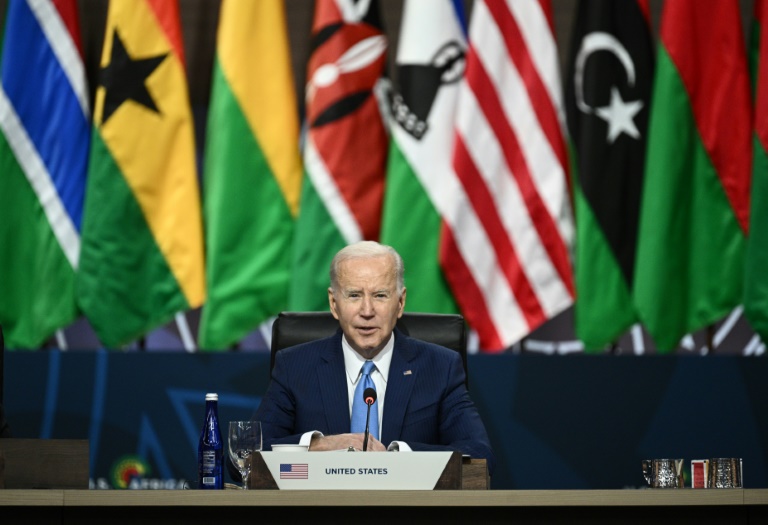Biden tells leaders US is ‘all in’ for Africa

US President Joe Biden backed a permanent African Union role in the Group of 20 economies and said he was planning a visit, the first by a US president since 2015, to sub-Saharan Africa
Washington – President Joe Biden threw his support Thursday behind a larger African role in the world but also vowed the United States would not shy away from promoting democracy.
“The United States is all in on Africa,” Biden told nearly 50 African leaders who have gathered in Washington for three days.
“Africa belongs to the table in every room — every room for global challenges that are being discussed — and in every institution,” Biden said.
Biden, who in September called for an African permanent seat on the UN Security Council, backed a permanent African Union role in the Group of 20 economies and said he was planning a visit, the first by a US president since 2015, to sub-Saharan Africa.
“We’re all going to be seeing you and you’re going to see a lot of us,” Biden said, without specifying the dates or destinations.
Biden a night earlier invited African leaders to a gala White House dinner, with the African Union arriving first to the red carpet, as he pulled out the stops for the first such summit since Barack Obama launched an initiative in 2014.
Obama’s successor Donald Trump made little secret of his lack of interest in Africa, where in the ensuing years China — seen by the United States as its top global competitor — has become a key player through major investment.
– Democracy in ‘DNA’ –
The United States at the summit is laying out $55 billion in projects over the coming three years including investment in green energy, training for health workers and modernization of internet networks.
The private sector also pledged $15 billion in deals led by investments by US firms in digital technology.
In a contrast with China, which has been happy to do business with all African regimes, the United States has made a point of stressing democracy, even if Biden still invited leaders seen as authoritarian.
“The United States will always lead with our values,” Biden told the African leaders.
“Support for democracy, respect for the rule of law, commitment to human rights, responsible government, all are part of our DNA.”
Biden, while announcing $100 million for security, also said the United States would invest $75 million to counteract “democratic backsliding” including by strengthening electoral authorities and civil society.
On Wednesday, Biden met jointly with the leaders of six nations that hold elections next year including Nigeria and the Democratic Republic of Congo, sub-Saharan Africa’s largest countries in population and size respectively, to seek promises on free elections.
Mark Green, a former congressman and head of the US Agency of International Development, said that the United States was focused on building self-reliance in Africa, while China was looking to “reinforce aid dependency.”
“If a Chinese investment in Africa leads to greater self-reliance, somebody in Beijing is going to lose his or her job,” said Green, now president of the Wilson Center.
China denies US accusations it is putting developing nations into a “debt trap” and in turn has called on Washington not to see Africa through the prism of geopolitical competition.
– Countering Russia –
Senegalese President Macky Sall, the current chair of the African Union, welcomed US support for the institution and voiced appreciation for Biden’s summit.
But he also called for the United States to end longstanding rights sanctions on Zimbabwe and voiced alarm over a bill in the US Congress that would impose sanctions on African countries over dealings with Russia.
“This would be the first time in international relations that a whole continent is targeted,” Sall told Biden before the leaders.
Biden will later Thursday lead a session on food security as his administration emphasizes US assistance and points the finger at Russia for a sharp spike in global prices that has contributed to hunger, especially on the drought-struck Horn of Africa.
Russia in February invaded Ukraine, a major exporter of grains to the developing world.
Russia has sought to rally African public opinion by blaming food inflation not on the war itself, but on Western sanctions imposed on Moscow in response.
